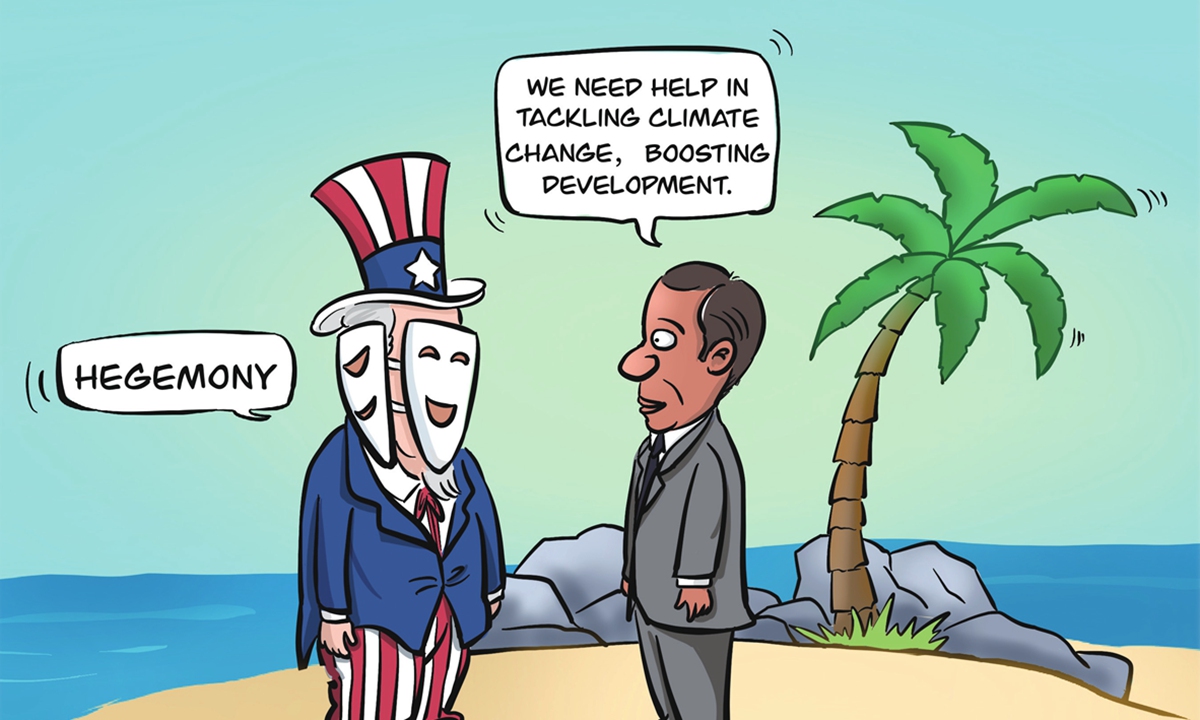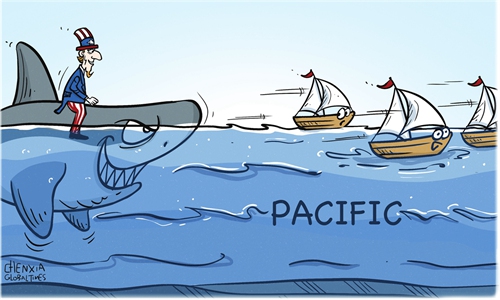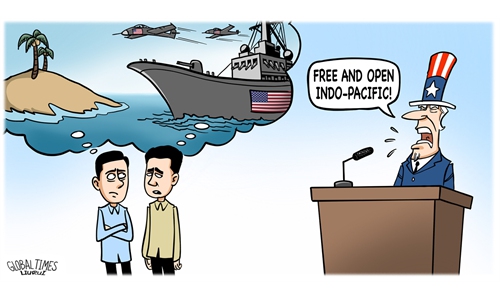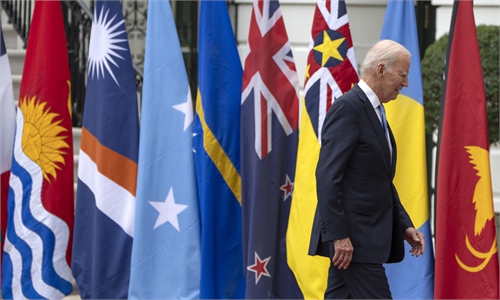US hegemonic logic clashes with development concerns of Pacific Island countries

Illustration: Liu Xidan/GT
The 52nd Pacific Islands Forum Leaders Meeting began on Monday in the Cook Islands. Since Joe Biden took office, the US has been increasing its investments and focus toward the Pacific, the world's most aid-dependent region. As Washington stepped up its efforts to woo the Pacific Islands, some voices in the US started to argue that their country is "winning against China in Oceania." Yet, this is far from the reality.In every way, the US' current emphasis on Pacific Island countries is unprecedented. The Biden administration released the first-ever Pacific Partnership Strategy in September 2022, raising the importance of the Pacific Island countries in US diplomacy to a new level after World War II. As a result, Biden hosted two summits with the leaders of the Pacific Island countries in 2022 and 2023, and various senior US government officials have made rare and frequent visits to countries in the Pacific region.
All of these developments, from the reopening of the US embassy in the Solomon Islands after 30 years of absence, to the opening and the plan to open new embassies in several Pacific Island countries, to the announcement that the US Peace Corps will return to the region in 2024, are a clear signal that the Biden administration wants to send a clear message: America is back.
But such sudden attention and "care" from Washington overwhelmed the Pacific Island countries in certain ways. The Biden administration likes to boast about how close the relationship between the US and the Pacific Island countries is and how important these countries are to the US. However, all of this contrasts sharply with the decades of Washington "forgetting about" the Pacific Island countries when the region suffered from a slow socio-economic development. This clearly reflects the hypocrisy of the US.
In fact, what truly reshaped US policy toward the Pacific Islands is the country's intention of engaging in a strategic competition with China. The US aims to compete with China on a global scale and contain its influence. At the same time, it has made the Indo-Pacific region a key area of focus and introduced the Indo-Pacific Strategy, which takes strategic competition with China as its guiding principle. In this context, the Pacific Island countries have been included in the layout of Washington's Indo-Pacific Strategy, and have become a new battleground for the US attempt at curbing China's influence.
It can be said that the US policy toward the Pacific Islands is only a part of its strategy of containment and competition with China. In other words, if there were no China-US strategic competition, it is possible that the US president doesn't care, or would not even know, which countries are in the Pacific region.
The US has continuously attacked and smeared China's relations with the Pacific Islands after its comeback to the region. However, it fails to see that during the years when these countries fell into oblivion in the US' vision, China has been actively developing its relations with them, genuinely helping their development, providing them with economic and technological assistance without attaching any political conditions, and solving many livelihood problems for them. It should be emphasized that China has never targeted or excluded any party in developing its relations with the Pacific, nor has it had any geopolitical calculations. This is what the people of regional countries can see very clearly.
The US views military and security as the foundation of its hegemony in the Pacific; therefore, it believes China's security cooperation with some Pacific Island countries has a military purpose and will seriously challenge US hegemony. Such a mind-set clearly shows the US hegemony's anxiety and particular attention to military security, which leads Washington to enhance its security cooperation with the Pacific Island countries, including signing an agreement with Papua New Guinea on defense and maritime security cooperation, renewing the Compacts of Free Association for 20 years with the three Pacific Island sovereign states of the Federated States of Micronesia, the Republic of the Marshall Islands and the Republic of Palau, as well as pushing forward Quad to intervene in the affairs of regional countries.
However, all of this runs counter to the demands of the island countries. First, the Pacific Island countries see climate change as the only major security threat, but the US climate policy often swings back and forth. Second, these countries are most concerned about development, but the US' policy toward the region has a strong military-security undertone. Moreover, fundamentally, the US seeks to reengage and control the South Pacific region through aid and other means as a way to compete with China and defend its own hegemony, which is also against the will of the Pacific Islands. The hegemonic logic of the US is therefore bound to clash with the climate and development concerns of the regional countries.
The author is an assistant research fellow at the China Institute of International Studies. opinion@globaltimes.com.cn



